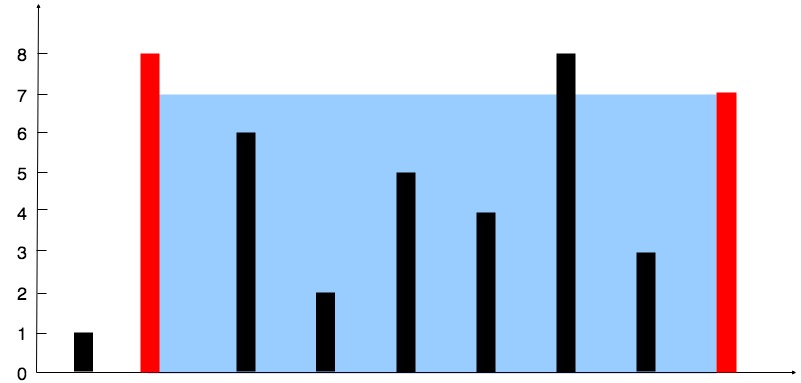You are given an integer array height of length n. There are n vertical lines drawn such that the two endpoints of the ith line are (i, 0) and (i, height[i]).
Find two lines that together with the x-axis form a container, such that the container contains the most water.
Return the maximum amount of water a container can store.
Notice that you may not slant the container.
Example 1:

Input: height = [1,8,6,2,5,4,8,3,7]
Output: 49
Explanation: The above vertical lines are represented by array [1,8,6,2,5,4,8,3,7]. In this case, the max area of water (blue section) the container can contain is 49.
Example 2:
Input: height = [1,1]
Output: 1
Constraints:
n == height.length2 <= n <= 1050 <= height[i] <= 104
This can be solved by two pointers.
- Start with pointer left=0 and pointer right=length-1
- The max water is limited by the pointer with smaller height
- When moving a pointer, the width of the area decrease
- If we move the pointer with higher height, we will never get a
greater area, the max height will be at most the one of the pointer with smaller height. - So we need to move the pointer with smaller height to have a chance to get higher height at the next step.
Things to consider:
- As we are concerned with maximum area, whenever we see the height is low, we will either increment from start or decrement from the end.
class Solution { public: int maxArea(vector<int>& height) { int left = 0, right = height.size()-1; int maxA = 0; while (left < right) { if (height[left] < height[right]) { maxA = max(maxA, height[left] * (right - left)); left++; } else { maxA = max(maxA, height[right] * (right - left)); right--; } } return maxA; } };
Simplified Solution
class Solution { public: int maxArea(vector<int>& height) { int maxArea = 0, start = 0, end = height.size() - 1; while (start < end) { maxArea = max(maxArea, min(height[start], height[end]) * (end - start)); if (height[start] < height[end]) { start++; } else { end--; } } return maxArea; } };
Comments
Post a Comment